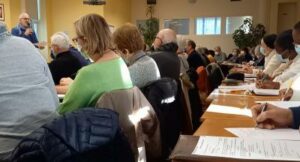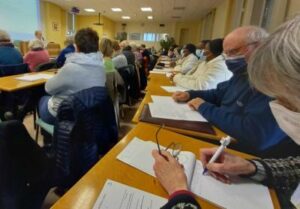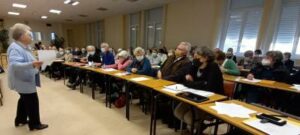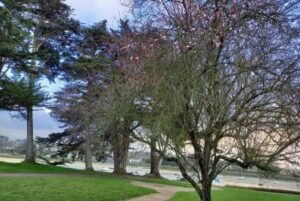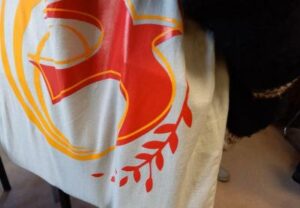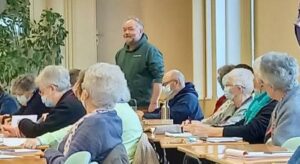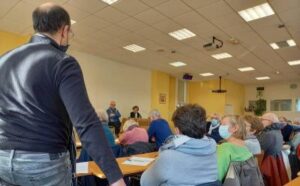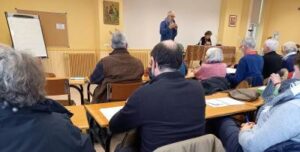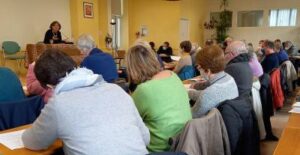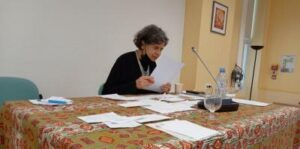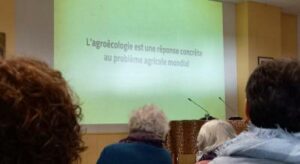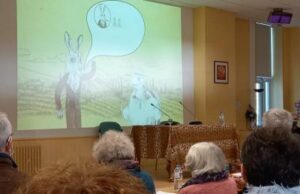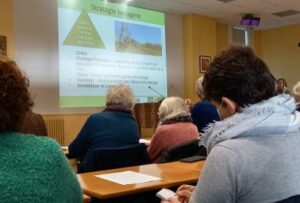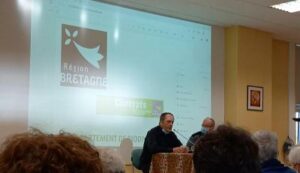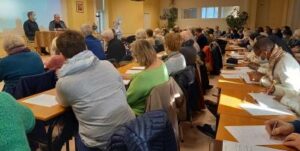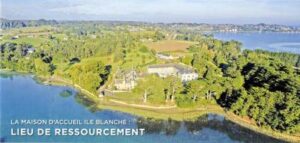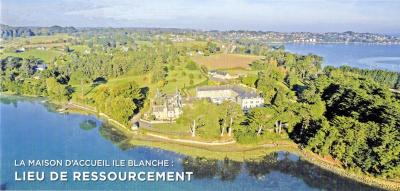It was a big crowd at the Ile Blanche in Brittany, France, on Saturday 19th February 2022, people from different backgrounds coming together to “walk a path towards integral ecology”, to experience a day of work, meeting and sharing, on the initiative of Ile Blanche Community.
Among the hundred or so participants who came from various networks, associations and movements in link with Ile Blanche, the Daughters of the Holy Spirit were present: Ann Almodovar and Anne Marie Le Pabic, Philo Ac’h and Elisabeth Boudonnet, the members of the extended Provincial Council, the leader of each zone. The theme of this day is of particular interest to us as it directly echoes the decisions of the last General Chapter.
First, we received some sequences on some ecological conversion projects in progress or under study: – in Lannion: a third place of social and ecological mix created at the initiative of the the group “Mission France”. – in Guiclan, an ecological conversion of agricultural land, initiative of « Fathers of Saint Jacques of Haiti. – at “Ile Blanche”, a remodelling of the park, in line with the purpose of the Center.
We also heard from the “Chrétiens en monde rural” (CMR) (Christians in Rural Area), with their programme of remeshing grove; the “Communauté Vie chrétienne” (CVX) ( Christian Life Community) for whom ecological conversion is at the heart of the year’s project; the “CCFD Terre solidaire” (Earth Solidarity) which is implementing a programme of “Transition towards a Peasant Agroecology at the service of food sovereignty”; and finally the diocesan Church which is presenting the “Green Church” label, a means implemented to help Christian communities to live out the necessary ecological transition.
In the second part of the morning, Elena Lasida, an economist and theologian, took us deeper into what integral ecology is, in the light of Laudato Si. It was a dense and fascinating talk, well anchored in the reality of life, from which I retain a few snippets:
“Integral ecology is a new creation that is being born, in the pains of childbirth… We are privileged to participate in this kairos, “this favourable time” when we must consent to a rupture, a loss, a death, so that something new can be born…; to re-connect what was separated… The central point of ecological conversion is relationship, in its four indissociable dimensions: relationship to oneself, to others, to nature, to God… Ecology is the science of relationship. Ecological conversion is the transformation of our earth into a “common home” where all living beings can live well together.
The problem is not to produce more or less, but to establish a different relationship with all living beings, to renounce the desire to control the environment.
Ecological conversion is based on three principles: Everything is connected. A major change to be lived: interdependence; this is not obvious in a world where everything is separate… Everything is given: nature does not belong to us; we are invited to experience gratuitousness and reciprocity in all our relationships… Everything is fragile: we must accept this fragility, not necessarily seek to “repair”, in order to invent something new, to welcome the unknown, to free creativity…
In the light of these three principles, the speaker analysed in a very positive way the experiences presented at the beginning of the morning.
To live the ecological conversion, three links should be privileged: a link of communion, moving from the collective to the “common“; a link of contemplation and celebration as opposed to the search for utility; a link of creation: letting something we do not yet know emerge, welcoming what happens to us. As opposed to planning.
After a frugal lunch, in keeping with the theme of the day, we were invited to meet any of the morning’s presenters for a dialogue, to ask questions…, before meeting again in workshops to discuss what touched us in the morning’s inputs and to express our questions and convictions to be brought up for debate.
Last stage: review of the questions, convictions, hopes… raised during the workshops, with the help of Elena Lasida and Patrick Salaün, the day’s moderator.
Some of the themes discussed: Repairing, recycling, making new things happen… How to make Church differently, the experience of the Synod… Dialogue, the only way to real democracy… The dynamics of fragility… The link between justice and ecology… French creativity and the relationship with failure and experimentation… Ecology and politics… The Citizens’ Climate Convention and its concrete consequences… Ecology and the social and solidarity economy… Ecological conversion and family education…
With a great sense of pedagogy and in a concrete way, Elena Lasida developed her thoughts and shared her experience on each of these themes, in dialogue with the participants.
In conclusion, the speaker strongly invited us to continue to work in networks, each one moving to listen to the other, in the fundamental conviction that ecological conversion is above all a relationship to be lived, a shift to be made…
The last word of the day went to Thérèse Revault, initiator of the day with her community. Thérèse expressed her joy at this meeting and expressed the wish that the network set in motion for the day would continue, with each person making their own contribution…
And we ended the day by singing together our faith and hope, in french, as we had done in the morning:
“Come the new heavens and the new earth that your goodness will give us!”
Come the new heavens and the new earth where justice will dwell!”
Jeanne Le Roux DHS – 21st February 2022. Published on 21 February 2022
